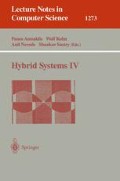Abstract
Formal verification in computer science often takes a worst case view towards performance and uses induction to prove specification invariants. In control theory, robust control takes a worst-case view towards performance; nominal performance proofs often use derivative information to prove invariance of specification sets. In this note, we explore a toolbox for proving (positive) invariance of state-space sets with respect to the actions of dynamical systems. The focus is on dynamical systems given.by differential equations, building up to hybrid systems.
During preparation: Post-doc, Lab. for Information and Decision Systems. Currently: Asst. Prof., Dept. of Electrical Eng. and Applied Physics, Case Western Reserve University, 10900 Euclid Avenue, Cleveland, OH 44106-7221.
Undergraduate student, Lab. for Computer Science.
Prof., Lab. for Computer Science.
Preview
Unable to display preview. Download preview PDF.
References
Panos Antsaklis et al., editors. Hybrid Systems II vol. 999, Lecture Notes in Computer Science. Springer, New York, 1995.
A. Benveniste and G. Berry, guest editors. Proc. of the IEEE, 79(9), 1991. Special Issue on The Synchronous Approach to Reactive and Real-Time Systems.
A. Benveniste and P. Le Guernic. Hybrid dynamical systems theory and the signal language. IEEE Transactions on Automatic Control, 35(5), 1990.
N. P. Bhatia and G. P. Szegö. Dynamical Systems: Stability Theory and Applications, vol. 35 of Lecture Notes in Mathematics. Springer, Berlin, 1967.
J. W. de Bakker et al., editors. Real-Time: Theory in Practice, vol. 600 of Lecture Notes in Computer Science. Springer, New York, 1991.
E. Dolginova and N. Lynch. “Safety Verification for Automated Platoon Manuevers: A Case Study.” In O. Maler, ed., Hybrid and Real-Time Systems (HART '97), pp. 154–170, Springer, 1997.
J. Frankel et al. “Robust Platoon Maneuvers for AVHS,” California PATH report, UCB, 1995. Preprint.
R. L. Grossman et al., editors. Hybrid Systems, vol. 736 of Lecture Notes in Computer Science. Springer, New York, 1993.
N. Halbwachs. Synchronous Programming of Reactive Systems. Kluwer Academic, Boston 1993.
J.H. Hubbard and B.H. West. Differential Equations: A Dynamical Systems Approach. Springer, New York, 1990.
M. Joseph, editor. Formal Techniques in Real-Time and Fault-Tolerant Systems, vol. 331 of Lecture Notes in Computer Science. Springer, New York, 1988.
N. Lynch. Distributed Algorithms. Morgan Kaufmann, San Francisco, 1996.
N. Lynch et al. Hybrid I/O Automata. In R. Alur, T. Henzinger, and E. Sontag, editors, Hybrid Systems III, pp. 496–510, Lecture Notes in Computer Science, vol. 1066, Springer, 1996.
O. Maler, Z. Manna, and A. Pnueli. From timed to hybrid systems. In de Bakker et al. [5], pp. 447–484.
Z. Manna and A. Pnueli. Verifying hybrid systems. In Grossman et al. [8], pp. 4–35.
Z. Manna and A. Pnueli. The Temporal Logic of Reactive and Concurrent Systems. Springer, New York, 1991.
A. Pnueli and J. Sifakis, guest editors. Theoretical Computer Science, 138(1), 1995. Special Issue on Hybrid Systems.
H.L. Smith. Monotone Dynamical Systems: An Introduction to the Theory of Competitive and Cooperative Systems. Mathematical Surveys and Monographs, Vol. 41. American Mathematical Society, Providence, RI, 1995.
Y.-J. Wei and P.E. Caines. Hierarchical COCOLOG for finite machines. In G. Cohen and J-P. Quadrat, editors, Proc. 11th INRIA International Conference on the Analysis and Optimization of Systems, vol. 199 of Lecture Notes in Control and Information Sciences, pp. 29–38, New York, 1994. Springer.
J. Lygeros, D. Godbole, S. Sastry. A verified hybrid control design for automated vehicles. Preprint.
A. Puri and P. Varaiya. Verification of hybrid systems using abstractions. Preprint.
Author information
Authors and Affiliations
Editor information
Rights and permissions
Copyright information
© 1997 Springer-Verlag Berlin Heidelberg
About this paper
Cite this paper
Branicky, M.S., Dolginova, E., Lynch, N. (1997). A toolbox for proving and maintaining hybrid specifications. In: Antsaklis, P., Kohn, W., Nerode, A., Sastry, S. (eds) Hybrid Systems IV. HS 1996. Lecture Notes in Computer Science, vol 1273. Springer, Berlin, Heidelberg. https://doi.org/10.1007/BFb0031553
Download citation
DOI: https://doi.org/10.1007/BFb0031553
Published:
Publisher Name: Springer, Berlin, Heidelberg
Print ISBN: 978-3-540-63358-7
Online ISBN: 978-3-540-69523-3
eBook Packages: Springer Book Archive

